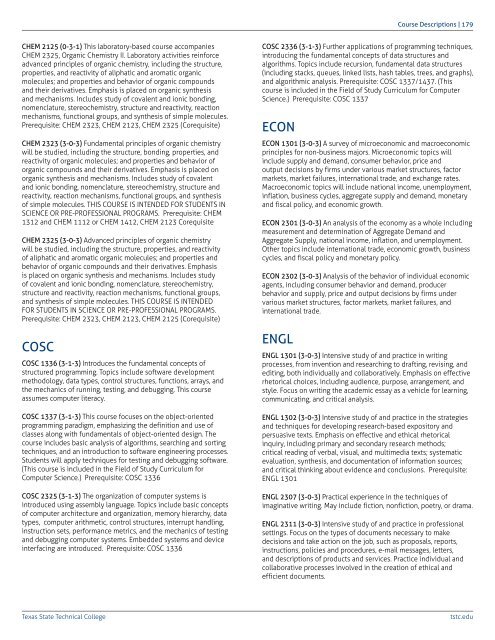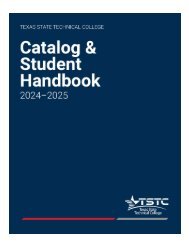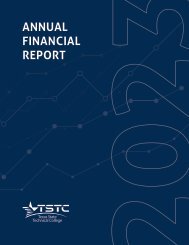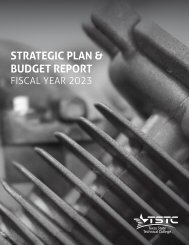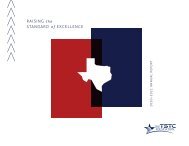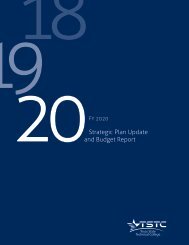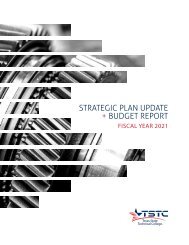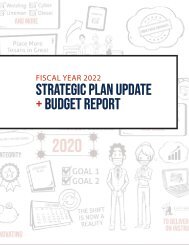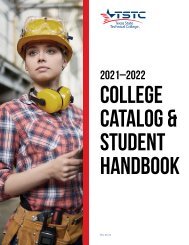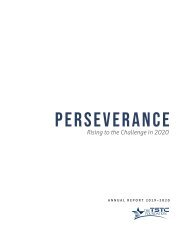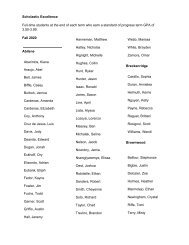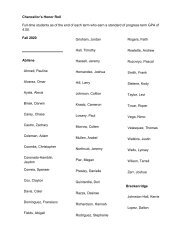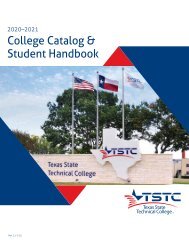Student Handbook and Catalog 2021-22 V2
Create successful ePaper yourself
Turn your PDF publications into a flip-book with our unique Google optimized e-Paper software.
Course Descriptions | 179<br />
CHEM 2125 (0-3-1) This laboratory-based course accompanies<br />
CHEM 2325, Organic Chemistry II. Laboratory activities reinforce<br />
advanced principles of organic chemistry, including the structure,<br />
properties, <strong>and</strong> reactivity of aliphatic <strong>and</strong> aromatic organic<br />
molecules; <strong>and</strong> properties <strong>and</strong> behavior of organic compounds<br />
<strong>and</strong> their derivatives. Emphasis is placed on organic synthesis<br />
<strong>and</strong> mechanisms. Includes study of covalent <strong>and</strong> ionic bonding,<br />
nomenclature, stereochemistry, structure <strong>and</strong> reactivity, reaction<br />
mechanisms, functional groups, <strong>and</strong> synthesis of simple molecules.<br />
Prerequisite: CHEM 2323, CHEM 2123, CHEM 2325 (Corequisite)<br />
CHEM 2323 (3-0-3) Fundamental principles of organic chemistry<br />
will be studied, including the structure, bonding, properties, <strong>and</strong><br />
reactivity of organic molecules; <strong>and</strong> properties <strong>and</strong> behavior of<br />
organic compounds <strong>and</strong> their derivatives. Emphasis is placed on<br />
organic synthesis <strong>and</strong> mechanisms. Includes study of covalent<br />
<strong>and</strong> ionic bonding, nomenclature, stereochemistry, structure <strong>and</strong><br />
reactivity, reaction mechanisms, functional groups, <strong>and</strong> synthesis<br />
of simple molecules. THIS COURSE IS INTENDED FOR STUDENTS IN<br />
SCIENCE OR PRE-PROFESSIONAL PROGRAMS. Prerequisite: CHEM<br />
1312 <strong>and</strong> CHEM 1112 or CHEM 1412, CHEM 2123 Corequisite<br />
CHEM 2325 (3-0-3) Advanced principles of organic chemistry<br />
will be studied, including the structure, properties, <strong>and</strong> reactivity<br />
of aliphatic <strong>and</strong> aromatic organic molecules; <strong>and</strong> properties <strong>and</strong><br />
behavior of organic compounds <strong>and</strong> their derivatives. Emphasis<br />
is placed on organic synthesis <strong>and</strong> mechanisms. Includes study<br />
of covalent <strong>and</strong> ionic bonding, nomenclature, stereochemistry,<br />
structure <strong>and</strong> reactivity, reaction mechanisms, functional groups,<br />
<strong>and</strong> synthesis of simple molecules. THIS COURSE IS INTENDED<br />
FOR STUDENTS IN SCIENCE OR PRE-PROFESSIONAL PROGRAMS.<br />
Prerequisite: CHEM 2323, CHEM 2123, CHEM 2125 (Corequisite)<br />
COSC<br />
COSC 1336 (3-1-3) Introduces the fundamental concepts of<br />
structured programming. Topics include software development<br />
methodology, data types, control structures, functions, arrays, <strong>and</strong><br />
the mechanics of running, testing, <strong>and</strong> debugging. This course<br />
assumes computer literacy.<br />
COSC 1337 (3-1-3) This course focuses on the object-oriented<br />
programming paradigm, emphasizing the definition <strong>and</strong> use of<br />
classes along with fundamentals of object-oriented design. The<br />
course includes basic analysis of algorithms, searching <strong>and</strong> sorting<br />
techniques, <strong>and</strong> an introduction to software engineering processes.<br />
<strong>Student</strong>s will apply techniques for testing <strong>and</strong> debugging software.<br />
(This course is included in the Field of Study Curriculum for<br />
Computer Science.) Prerequisite: COSC 1336<br />
COSC 2325 (3-1-3) The organization of computer systems is<br />
introduced using assembly language. Topics include basic concepts<br />
of computer architecture <strong>and</strong> organization, memory hierarchy, data<br />
types, computer arithmetic, control structures, interrupt h<strong>and</strong>ling,<br />
instruction sets, performance metrics, <strong>and</strong> the mechanics of testing<br />
<strong>and</strong> debugging computer systems. Embedded systems <strong>and</strong> device<br />
interfacing are introduced. Prerequisite: COSC 1336<br />
COSC 2336 (3-1-3) Further applications of programming techniques,<br />
introducing the fundamental concepts of data structures <strong>and</strong><br />
algorithms. Topics include recursion, fundamental data structures<br />
(including stacks, queues, linked lists, hash tables, trees, <strong>and</strong> graphs),<br />
<strong>and</strong> algorithmic analysis. Prerequisite: COSC 1337/1437. (This<br />
course is included in the Field of Study Curriculum for Computer<br />
Science.) Prerequisite: COSC 1337<br />
ECON<br />
ECON 1301 (3-0-3) A survey of microeconomic <strong>and</strong> macroeconomic<br />
principles for non-business majors. Microeconomic topics will<br />
include supply <strong>and</strong> dem<strong>and</strong>, consumer behavior, price <strong>and</strong><br />
output decisions by firms under various market structures, factor<br />
markets, market failures, international trade, <strong>and</strong> exchange rates.<br />
Macroeconomic topics will include national income, unemployment,<br />
inflation, business cycles, aggregate supply <strong>and</strong> dem<strong>and</strong>, monetary<br />
<strong>and</strong> fiscal policy, <strong>and</strong> economic growth.<br />
ECON 2301 (3-0-3) An analysis of the economy as a whole including<br />
measurement <strong>and</strong> determination of Aggregate Dem<strong>and</strong> <strong>and</strong><br />
Aggregate Supply, national income, inflation, <strong>and</strong> unemployment.<br />
Other topics include international trade, economic growth, business<br />
cycles, <strong>and</strong> fiscal policy <strong>and</strong> monetary policy.<br />
ECON 2302 (3-0-3) Analysis of the behavior of individual economic<br />
agents, including consumer behavior <strong>and</strong> dem<strong>and</strong>, producer<br />
behavior <strong>and</strong> supply, price <strong>and</strong> output decisions by firms under<br />
various market structures, factor markets, market failures, <strong>and</strong><br />
international trade.<br />
ENGL<br />
ENGL 1301 (3-0-3) Intensive study of <strong>and</strong> practice in writing<br />
processes, from invention <strong>and</strong> researching to drafting, revising, <strong>and</strong><br />
editing, both individually <strong>and</strong> collaboratively. Emphasis on effective<br />
rhetorical choices, including audience, purpose, arrangement, <strong>and</strong><br />
style. Focus on writing the academic essay as a vehicle for learning,<br />
communicating, <strong>and</strong> critical analysis.<br />
ENGL 1302 (3-0-3) Intensive study of <strong>and</strong> practice in the strategies<br />
<strong>and</strong> techniques for developing research-based expository <strong>and</strong><br />
persuasive texts. Emphasis on effective <strong>and</strong> ethical rhetorical<br />
inquiry, including primary <strong>and</strong> secondary research methods;<br />
critical reading of verbal, visual, <strong>and</strong> multimedia texts; systematic<br />
evaluation, synthesis, <strong>and</strong> documentation of information sources;<br />
<strong>and</strong> critical thinking about evidence <strong>and</strong> conclusions. Prerequisite:<br />
ENGL 1301<br />
ENGL 2307 (3-0-3) Practical experience in the techniques of<br />
imaginative writing. May include fiction, nonfiction, poetry, or drama.<br />
ENGL 2311 (3-0-3) Intensive study of <strong>and</strong> practice in professional<br />
settings. Focus on the types of documents necessary to make<br />
decisions <strong>and</strong> take action on the job, such as proposals, reports,<br />
instructions, policies <strong>and</strong> procedures, e-mail messages, letters,<br />
<strong>and</strong> descriptions of products <strong>and</strong> services. Practice individual <strong>and</strong><br />
collaborative processes involved in the creation of ethical <strong>and</strong><br />
efficient documents.<br />
Texas State Technical College<br />
tstc.edu


